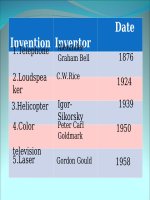Unit 03. Music. Lesson 1. Getting started
Bạn đang xem bản rút gọn của tài liệu. Xem và tải ngay bản đầy đủ của tài liệu tại đây (424.89 KB, 22 trang )
Unit 3: Music
Getting started and language
What is the name of the song?
1. Because you live
2. Hit the light
3. I need a girl
4. Where do we go
5. New York
6. One day
7. Baby one more time
8. Love the way you lie
9. Wrecking ball
10. See you again
Vocabularies
•
•
•
Listen to the definition
Raise the correct words
Get 1 point for the correct and the fastest answer.
Vocabularies
•
To display on the Internet
Vocabularies
•
A performance by a single singers
Vocabularies
•
The forty best selling audio recordings for a given period
Vocabularies
•
A song, often from a full-length album or a compct disc
Vocabularies
•
To make a song or an album available to the public
Vocabularies
•
The first appearance of a set of musical recordings stored together in jackets
under one binding.
Vocabularies
•
A record awarded to a singer or group whose album has sold at least one million copies
Vocabularies
•
A performance by two singers
Vocabularies
•
An exceptional ability
Vocabularies
The story of a person life written by somebody else
Compound sentence
•
Simple Sentence =
Independent Clause
•
Compound Sentence =
Independent Clause + Independent Clause
Compound Sentences
•
•
A compound sentence contains two independent clauses.
Conjunctions (for, and, nor, but, or, and yet, so) join these independent clauses. (Hint: The
conjunctions spell FANBOYS.)
•
The conjunction used can impact the meaning of the sentence.
Sample Compound Sentences
•
The cat was unsuccessful in his attempt to catch the mouse, and the mouse was
equally as unlucky in his attempt to get the cheese.
•
•
•
The dog had watched all of this, but he had refused to become involved.
The mouse could wait until dark, or he could risk a daylight raid on the pantry.
The cat usually slept during the day, yet curiosity held him at the corner of the
kitchen.
TO-INFINITIVE, BARE-INFINITIVE & GERUND
--In a sentence, if a verb is used after the main verb, it can be in 3
different forms:
1. To-infinitive
e.g. I want
to eat
something.
(verb) (to-infinitive)
2. Bare-infinitive
e.g. I saw him
(verb)
cry
(bare-inf)
3. Gerund
e.g. I like swimming.
(verb) (gerund)
yesterday.
(1) TO-INFINITIVE
Agree
offer decide appear
refuse
seem plan
threaten want
forget
attempt
arrange
pretend
fail
promise tell
learn hope afford
ask
allow tend manage dare
-- ‘To-infinitive’ is usually used after the above verbs
e.g. I agreed to cooperate with them.
(verb) (to-infinitive)
He wants to buy this computer.
(verb) (to-inf)
Sentence Making: _____________________________ ________________
(2) BARE-INFINITIVE
see , notice, observe, watch, hear, feel, smell, make, let
-- ‘Bare-infinitive’ is usually used after the above verbs.
-- An ‘object’ is usually placed between the ‘verb’ and ‘bareinfinitive’.
e.g. She saw
him
steal your purse yesterday.
(verb) (object) (bare-inf)
They heard someone knock
the door.
(verb) (object) (bare-inf)
Sentence Making: ________________________________ ___________
(3) GERUND
stop
keep postpone admit consider miss
finish mind
imagine
deny
avoid risk
practise
enjoy
delay
involve fancy regret
suggest can’t help
-- ‘Gerund’ is usually used after the above verbs.
e.g. Do you mind opening the door?
(verb) (gerund)
I won’t risk doing this.
(verb) (gerund)
Sentence Making:___________________________________________
Fill in the blanks by using ‘to-inf’, ‘bare-inf’ or ‘gerund’.
making
1. Could you please stop ____________(make) so much noise?
to me
lendany money.
2. Tom refused ____________(lend)
try
3. Don’t let them ____________(try) this dangerous game!
writing
4. I don’t enjoy ____________ (write)
letters.
5. Miss Lee was very strict. No one dared ____________ (talk) during her
lessons.
to play
6. I ‘ve arranged ____________(play) tennis tomorrow afternoon.
cry
7. Tom made Ann ____________(cry) yesterday.
washing
8. Have you finished ____________(wash) your hair yet?
to look
9. Ann offered ____________(look) after our children while we were out.
stealing
10.He admitted _____________(steal) our car.
to go
11.She doesn’t want ____________(go) home now.
to talk
12.It is not allowed ____________(talk) in the library.
answering
13.Would you mind ____________(answer) me some questions?
14.They are watching their children ____________(play).
play
to talk









